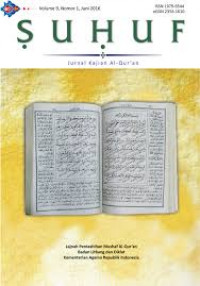
Artikel
Through the Lens of Gadamer’s Hermeneutics: In comparison between Amina Wadud’s and Mohammed Talbi’s Interpretations of Q. 4:34
Penilaian
0,0
dari 5Most of traditional Muslim exegetes interpret Q. 4:34 in terms of maintaining the superiority of men over women. Some progressive Muslim scholars then insist a contextual approach to the verse to criticize gender inequality. Among some progressive Muslim scholars, this article comparatively examines the interpretations of Amina Wadud and Mohammed Talbi of Q. 4:34. Although both of them propose a contextual reading of the verse, they have different intellectual background, approach and method in interpreting the Qur’ān. The questions are to what extent the similarities and differences of both Wadud’s and Talbi’s interpretation of Q. 4:34 and how far their interpretations reflect their respective intention and perspective? Applying Gadamer’s hermeneutical approach, the article concludes that [1] Both Wadud and Talbi argue that the verse does not establish the superiority of men over women, but acknowledges duties division among married couple; [2] the difference among their interpretations is on the status of relationship among married couple; [3] Wadud’s and Talbi’s interpretations represent their respective hermeneutical situations and the way they define ontologically the nature of interpretation and Qur’anic hermeneutics affect on producing the meanings of the verse.
Ketersediaan
| Suh 20180103 | J 297.1 Suh | Perpustakaan A. Yani | Tersedia namun tidak untuk dipinjamkan - No Loan |
Informasi Detail
- Judul Seri
-
-
- No. Panggil
-
J 297.1 Suh
- Penerbit
- Jakarta : Balitbang Kementerian Agama RI., 2016
- Deskripsi Fisik
-
ii ,10 hlm, 24 cm
- Bahasa
-
Indonesia
- ISBN/ISSN
-
19796544
- Klasifikasi
-
297.1
- Tipe Isi
-
-
- Tipe Media
-
-
- Tipe Pembawa
-
-
- Edisi
-
Suhuf ,Vol 1, Tahun XI,Mei 2017
- Subjek
- Info Detail Spesifik
-
-
- Pernyataan Tanggungjawab
-
-
Versi lain/terkait
Tidak tersedia versi lain
Lampiran Berkas
Komentar
Anda harus masuk sebelum memberikan komentar
 Karya Umum
Karya Umum  Filsafat
Filsafat  Agama
Agama  Ilmu-ilmu Sosial
Ilmu-ilmu Sosial  Bahasa
Bahasa  Ilmu-ilmu Murni
Ilmu-ilmu Murni  Ilmu-ilmu Terapan
Ilmu-ilmu Terapan  Kesenian, Hiburan, dan Olahraga
Kesenian, Hiburan, dan Olahraga  Kesusastraan
Kesusastraan  Geografi dan Sejarah
Geografi dan Sejarah